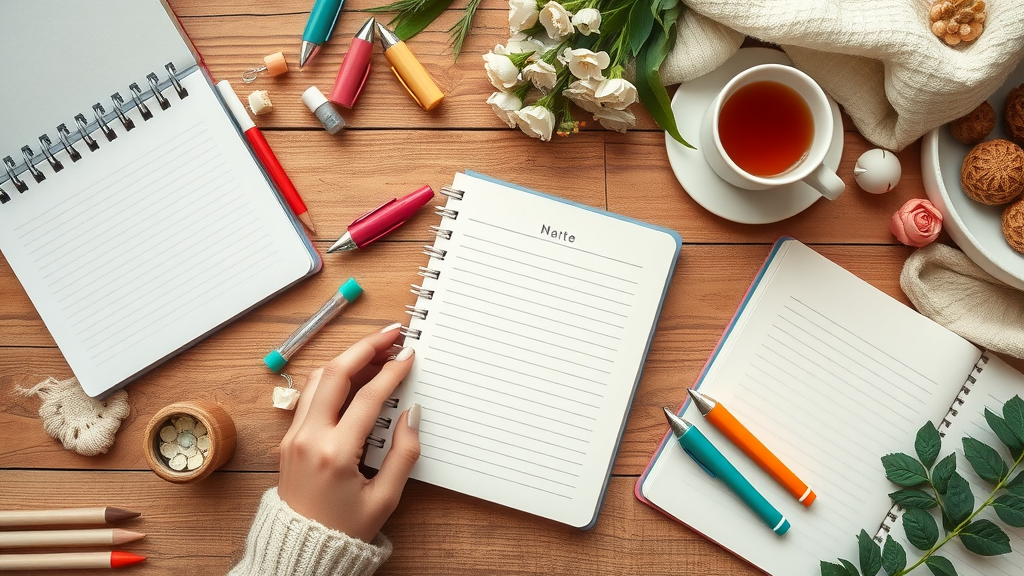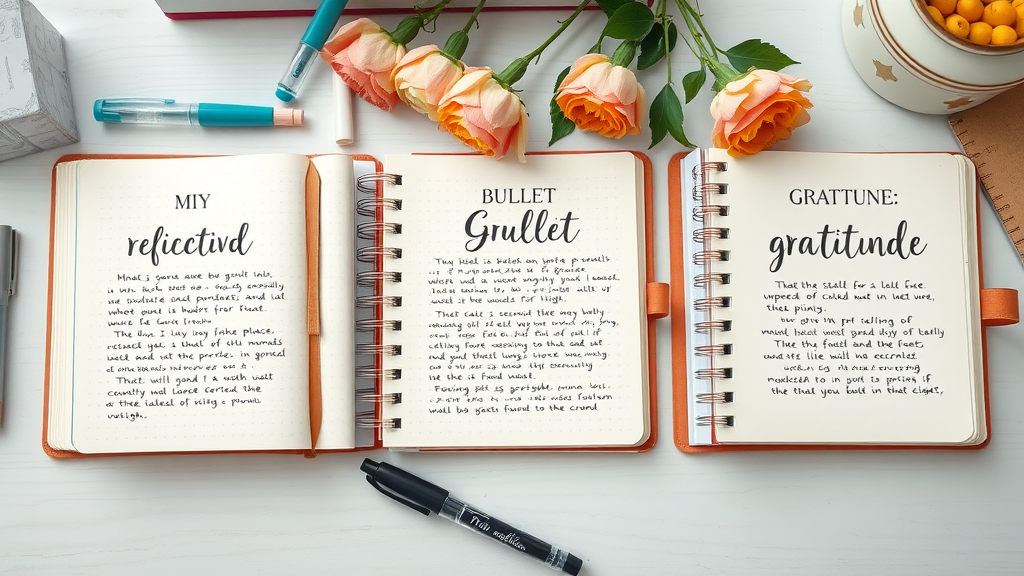Did you know? Recent studies reveal that women who journal regularly enjoy a remarkable 34% greater sense of emotional well-being compared to those who don’t. If you’re searching for a simple, empowering wellness tool, read on to discover why journaling is the secret practice modern women can’t stop talking about—and how you can start journaling today, no matter where you are in your journey.

Startling Facts: Why Journaling is Transforming Women’s Wellbeing
Journaling is more than just a trendy hobby—it’s a proven mental health support system that’s uniquely suited to women’s needs. Not only does it help reduce daily mental distress, but research has shown a profound impact on emotional balance, daily stress management, and decision-making clarity. For women juggling work, relationships, family, and self-care, the ability to write down your thoughts and emotions can be a transformative act of self-nurturing. The benefits of journaling are especially remarkable for women experiencing major life events, such as career changes, motherhood, or transitions in health conditions.
“Women who engage in regular journaling report a 34% higher sense of emotional well-being.” — Journal of Health Psychology
This isn’t just about recording blank pages or starting a journal for the sake of it. The real value lies in regular self-reflection, tracking your progress, and using expressive writing to turn negative thoughts into sources of positive growth. Combining a daily journal with targeted journal prompts empowers women to navigate challenges, celebrate their successes, and invest in their own mental health—all with as little as five minutes a day.

What You’ll Learn About Journaling
- The benefits of journaling for women’s mental health
- How to start journaling today
- Different types of journaling and their unique impacts
- Tools, journal prompts, and expert tips for a sustainable journaling practice
Understanding Journaling: What It Means and Why It Matters
What does it mean to do journaling?
Journaling is the practice of writing down your thoughts and feelings in a dedicated journal, notebook, or digital app. For women, this serves as much more than a record of daily events—it’s a safe space for expressing thoughts, exploring emotions, setting personal goals, and tracking growth over time. Journaling can take many forms: from using a daily journal to jot down short notes about your mood, to crafting expressive entries that dig deeper into mental health or personal aspirations. Whether it’s a quick bulleted list or a free-flowing reflective journal entry, the key is authentic self-expression.
It’s not about perfect prose or spelling; it’s about honesty and self-exploration. Many women use journaling to process difficult emotions, clarify big decisions, or simply anchor their day with a grounding creative ritual. The act of start writing your thoughts can disrupt negative thought cycles, provide new perspectives on life events, and empower you to see patterns that inform better self-care. From the classic “dear diary” to creative bullet journal spreads, there’s no single “right” way to start journaling—only what works for you.

The Science Behind Journaling and Women’s Mental Health
How journaling alleviates mental distress
The mental health benefits of journaling extend deep into the way our brains and emotions process daily life. When women engage in consistent journaling, studies reveal significant decreases in anxiety, lower levels of stress hormones, and improved resilience to mental distress. The secret is in the process known as expressive writing— capturing raw thoughts and emotions on paper. This allows the mind to offload worries, organize scattered thoughts, and break persistent cycles of negative thinking.
For women facing overwhelming responsibilities or emotional health conditions, journaling offers an effective, evidence-based tool for creating emotional distance from stressful triggers. The simple act of starting a journal entry—whether in a gratitude journal or a bullet journal—encourages self-reflection and mindfulness, key pillars of positive psychology. Journaling can also enhance emotional intelligence, providing deeper understanding of one’s own needs and patterns. This fosters increased self-acceptance and cultivates a sense of calm, making it easier to thrive amidst everyday pressures.
The Profound Benefits of Journaling for Women
| Top Benefits of Journaling | Applicable To Women's Wellness? |
|---|---|
| Stress reduction | Yes |
| Clarity in decision-making | Yes |
| Enhanced connection with gratitude | Yes |
| Emotional balance | Yes |
| Personal growth | Yes |
Exploring the mental health benefits of journaling
The benefits of journaling for women go beyond mere stress relief. Journaling is shown to enhance problem-solving skills, boost self-confidence through reflection on achievements, and counterbalance the negative impact of daily pressures or health conditions. For women who struggle with anxiety, depression, or the emotional fallout of major life events, keeping a journal becomes a trusted ally, providing a safe space for unfiltered expression and validation of feelings.
In addition, women who use journal prompts tailored for mental health—such as gratitude journaling or daily affirmation exercises—report increased optimism and lower levels of emotional burnout. The structure of a daily journal or bullet journal helps organize life’s chaos, enabling you to prioritize self-care, track habits, and set realistic goals for well-being. Over time, your journaling practice can become a powerful life map—helping you celebrate growth, spot emerging challenges, and stay connected to your best self.

Journaling Methods: How to Start Journaling for Women’s Wellness
How do beginners start journaling?
Beginning a journaling practice is refreshingly simple, even for those new to self-reflection or uncertain where to start writing. First, select a journal style that excites you—a lined notebook, a gratitude journal, or a digital journal app for your phone. Start with simple journal prompts to ease into the practice, such as “What am I grateful for today?” or “What’s one thing I learned this week?” For maximum mental health benefits, aim for a small daily or weekly writing session: even five to ten minutes is enough to see progress.
- Simple journal prompts for getting started
- Recommended frequency and routines
- Overcoming barriers: Perfectionism, privacy, time
- The role of bullet journal and daily journal layouts for women
To overcome perfectionism—one of the biggest hurdles for women—remind yourself that your journal entries don’t have to be polished or profound. They only need to be honest. If privacy is a concern, consider a lockable journal or secure digital alternative. If time is tight, keep your journal nearby and jot quick bullet points as inspiration strikes. Many women love the bullet journal format for its flexibility: you can mix lists, mood trackers, goal sheets, and reflections all in one place.

Popular Types of Journaling and Their Effects on Women
What are the three types of journaling?
- Reflective journaling for processing emotions
- Bullet journal for organization and motivation
- Gratitude journal for building positivity
- Incorporating art journaling and digital options
Women have more choices than ever when it comes to journaling styles. Reflective journaling is ideal for emotional release and mental clarity. Here, you might write diary-style entries to process your thoughts and feelings after a stressful day, major life event, or meaningful accomplishment. The bullet journal offers an adaptable system that merges organization with self-expression—it’s perfect for women who crave both creative flexibility and structured daily planning.
The gratitude journal focuses on documenting daily joys, wins, and the people or experiences you’re most thankful for. This approach is closely tied to positive psychology, with research showing that gratitude journaling lifts mood, counters negative thought patterns, and fosters lasting emotional well-being. Don’t overlook digital options, especially if you find typing faster or crave on-the-go access. Whether you use a dedicated journal app or start an art journaling routine, explore what feels most motivating for you—and combine multiple methods if it keeps you inspired.

Journaling Techniques for Daily Success: The 3 3 3 Method and Beyond
What is the 3 3 3 method of journaling?
The 3 3 3 method of journaling is a simple, structured approach that’s gained popularity among women aiming for more mental clarity and steady self-reflection. The technique involves, each day, listing three things you’re grateful for, three things you wish to accomplish, and three things you forgive yourself for or want to release. This concise writing session encourages positive psychology, boosts self-acceptance, and gently expands your awareness of daily wins and challenges.
Many women find that the 3 3 3 method removes the intimidation of the blank page and turns journaling into a quick, actionable routine. For those seeking a low-barrier way to start journaling, this format offers both structure and room for emotional exploration, allowing you to acknowledge mental distress and celebrate everyday progress side-by-side.
Incorporating daily journal and bullet journal strategies for busy women
Balancing a career, home, and personal aspirations can make consistently keeping a journal challenging. Luckily, integrating a daily journal or bullet journal doesn’t have to add pressure; instead, it can serve as a powerful tool for managing priorities and tracking wellness. Set aside a slot in your morning or evening routine—before checking your phone, jot a few sentences about how you’re feeling, your top goal for the day, or a quote that motivates you. Use bullet journal layouts with mood trackers, habit logs, or wellness check-in boxes to streamline tasks, priorities, and emotional patterns.
Even busy women can make the most of brief writing sessions: keep your journal in your bag, sync digital entries between devices, or dedicate a few minutes during lunch breaks. By making journaling as accessible as possible, you unlock daily support for mental health and personal growth—with every line serving as a step towards the empowered, centered woman you aspire to be.

Integrating Positive Psychology and Journaling for Women
How gratitude journaling unleashes positivity
Positive psychology research points to gratitude journaling as a proven strategy for cultivating optimism and emotional resilience among women. By consistently recording what you appreciate—whether it’s friends, family, health, or simple daily joys—you gradually shift your mindset from stress and scarcity to abundance and empowerment. Writing down your gratitude helps rewire your brain to spot the good even in challenging circumstances, building self-worth and a deeper sense of joy.
Gratitude journals are especially effective after difficult life events or periods of mental health struggle. This approach doesn’t ignore pain or negative thought patterns; rather, it counterbalances them with evidence of hope and goodness, no matter how small. Many women report that reflecting on grateful moments boosts their mood, improves sleep, and creates a ripple effect of positivity in relationships and work.

Positive psychology journal prompts for women
- List three recent successes (big or small)
- Describe a challenge you overcame
- Reflect on relationships that enrich your life
Using guided journal prompts rooted in positive psychology can help women uncover inner strengths and appreciate their progress. By documenting small victories, embracing resilience, and expressing appreciation for supportive relationships, women activate a virtuous cycle of positivity. These writing prompts are easy to incorporate into your daily or weekly journaling practice—empowering you to acknowledge growth and nourish your self-esteem. Over time, this intentional focus on strengths, gratitude, and supportive social connections becomes a strong foundation for long-lasting mental wellness.
Best Practices: Keeping a Journal for Sustainable Growth
How to write in your journal consistently
- Create a ritual or routine
- Set a daily or weekly reminder
- Join a journaling group or online forum for women
- Invest in quality journals and pens
Consistency is the cornerstone of a rewarding journaling practice. Create a dedicated writing ritual: maybe it’s journaling with a cup of tea every evening, or starting your day with a few lines of reflection. Use reminders—on your phone, calendar, or sticky notes—to prompt regular writing sessions. Many women find accountability with social support: consider joining a virtual journaling circle or an online forum dedicated to women’s wellness and creativity.
Investing in a journal and pen that you genuinely enjoy can also make a difference in staying motivated. The tactile pleasure of a favorite pen or a beautifully-bound notebook turns each writing session into a small act of self-care. With time, your journal will become a source of comfort, inspiration, and a powerful record of your journey.

Journaling Inspiration: Quotes from Successful Women
“Journaling is not just writing; it is a tool for empowerment and self-discovery.” — Dr. Maya Carter
Watch this inspiring montage of dynamic women sharing how journaling transformed their mental health and overall wellness, featuring calming rituals, empowering testimonies, and a glimpse into the power of collective reflection.
Want hands-on guidance? This step-by-step video tutorial walks you through starting your first journal, choosing prompts, and establishing a sustainable journaling routine designed specifically for women’s wellness.
Women’s Top FAQs About Journaling
Is journaling better handwritten or digital?
Both handwritten and digital journaling can offer powerful benefits for women’s mental health. Handwritten journals promote mindfulness and can enhance memory retention, while digital journaling is more convenient and easily accessible, especially for women on the go. The best method is the one that fits your lifestyle and makes you feel comfortable expressing your thoughts and feelings. Many women blend both approaches—handwriting for deep reflection and digital apps for quick, daily journal entries—to create a practice that evolves with their needs.
What should I write about if I don’t know where to start?
If you're facing a blank page, journal prompts are your best friend! Start with questions like, “What am I feeling right now?” or “What’s something positive that happened today?” Other ideas: reflect on a recent challenge, a life event that changed you, people who support you, or goals you’d like to reach. Remember, there are no rules—expressive writing works best when it’s authentic. Even jotting down quick bullet points about your mood or a gratitude list can kickstart your journaling journey.

Key Takeaways: Journaling for Women's Wellness
- Journaling supports mental health for women
- There are multiple styles: reflective, bullet, gratitude
- Women can start journaling today with simple prompts
- Consistency and authenticity drive journaling success
Stay Empowered: Subscribe for More Strategies
Ready to transform your life? Subscribe for more strategies on how to be a successful woman in every area of your life: http://spotlightonyoursuccess.com
Unlock your potential with journaling—start today and embrace a journey toward lasting mental health, positivity, and empowerment.
 Add Row
Add Row  Add
Add 




Write A Comment